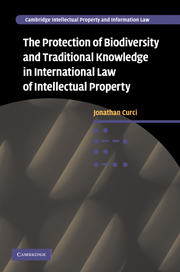Book contents
- Frontmatter
- Contents
- List of abbreviations
- Acknowledgments
- Part I The main problems
- Part II The protection of genetic resources in intellectual property law
- Part III The protection of traditional knowledge in the international patent system
- 4 Towards clearer legal definitions
- 5 The construction of an access- and benefit-sharing regime and intellectual property issues: criteria and options
- 6 The defensive protection of traditional knowledge in international patent law
- 7 Positive protection of traditional knowledge
- 8 Final observations
- Index
- Cambridge Cultural Social Studies
- References
8 - Final observations
from Part III - The protection of traditional knowledge in the international patent system
Published online by Cambridge University Press: 04 August 2010
- Frontmatter
- Contents
- List of abbreviations
- Acknowledgments
- Part I The main problems
- Part II The protection of genetic resources in intellectual property law
- Part III The protection of traditional knowledge in the international patent system
- 4 Towards clearer legal definitions
- 5 The construction of an access- and benefit-sharing regime and intellectual property issues: criteria and options
- 6 The defensive protection of traditional knowledge in international patent law
- 7 Positive protection of traditional knowledge
- 8 Final observations
- Index
- Cambridge Cultural Social Studies
- References
Summary
Article 27 of TRIPS Agreement has “globalized” IPRs on biotechnology and consequently spawned various controversies on its relation with relevant multilateral environmental treaties and customary norms. The controversies that have arisen during the negotiation of multilateral treaties establishing legal regimes of utilization of GRs (TRIPS, CBD and FAO Treaty) have opposed, on the one side, gene-hunting countries (technologically rich but poor in biodiversity), and, on the other side, gene-endowed countries (technologically poor but rich in biodiversity). The issues involved range from ownership of GRs and the protection of derivatives to the phenomenon of biopiracy, from the problem of preservation and sustainable use of biodiversity to the equitable benefit sharing thereof, including the ethical and moral issues that have been analyzed in this book.
The present study has demonstrated how international IP law is intertwined with other fields of public international law. IP law does not stand in clinical isolation, it rather needs to be interpreted in light of the relevant treaties. TRIPS, CBD, ITPGRFA, their derivative laws and their relationship with general international law have created a thick network of obligations that their State parties have to attentively analyze and comply with. There are various degrees in the acceptance of these treaties that often are monitored by different international organizations, thus revealing the complexities of the contemporary highly interconnected world.
- Type
- Chapter
- Information
- The Protection of Biodiversity and Traditional Knowledge in International Law of Intellectual Property , pp. 326 - 333Publisher: Cambridge University PressPrint publication year: 2009



